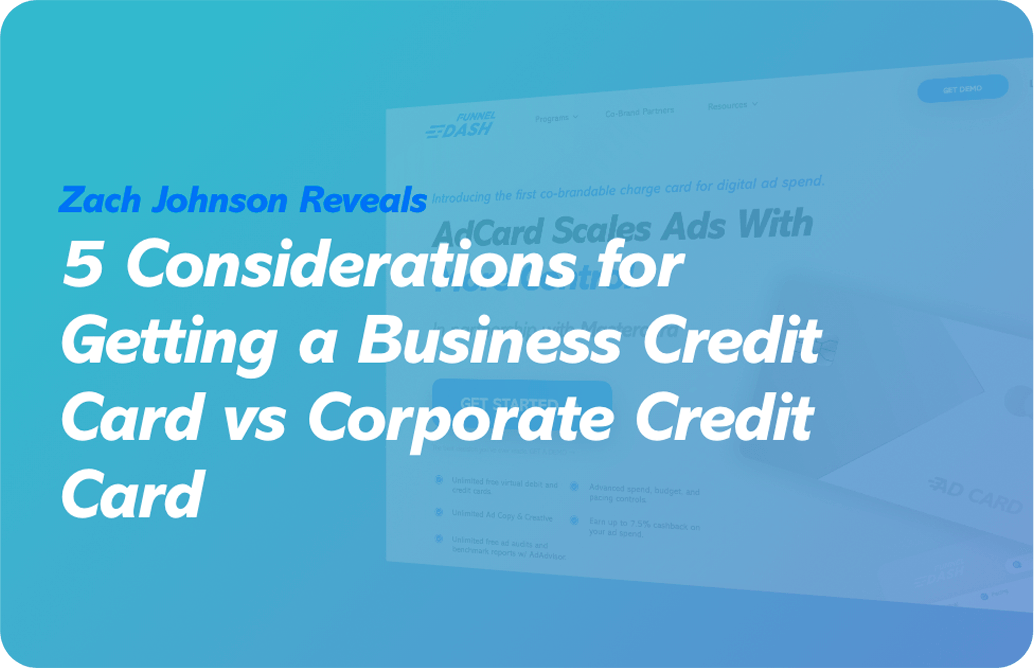
There are many different types of credit cards that exist today, but the two most common for business owners are corporate credit cards and business credit cards. A corporate card is a card issued by a company to an employee for use as their own personal card. It is usually paid off monthly from the individual's paycheck.
A business credit card can be used by any person with authority in the company to buy items on behalf of the company or organization without having to wait for company approval. These cards often have higher spending limits than personal credit cards and offer rewards programs, which makes them perfect for businesses who need to make large purchases or travel frequently.
1. Is a corporate card a good choice for a small business?
If your business has under 50 employees and you don't travel often, a corporate credit card might not be the best choice. Corporate cards are usually paid off monthly from an individual's paycheck and have high fees for late payments or over-limit charges.
A business credit card can help your company earn rewards points to spend on hotels, flights, rental cars, and other expenses that come with running a small business.
2. What is a business card account manager and do I need one?

An account manager is a person who works for the bank that issues your business credit card. Account managers can help you set up an account and get a higher spending limit, as well as answer any questions about managing your expenses
With a corporate card, you can get an account manager. This will help for more complex transactions like international purchases or requests for additional credit limit increases beyond the initial approved amount.
A business credit card usually doesn't come with an account manager and instead provides customer service by phone 24 hours per day, 365 days per year.
Here are the pros and cons of having an account manager:
The pros:
Account managers can answer any questions you have about managing expenses on your card. They also make sure that transactions go through when they review your account every day.
The Cons:
Account managers cost money, which is a downside for some people who only use their card to make purchases that are over $25.
3. Do corporate and business accounts come with custom credit alerts?

The answer is yes. Corporate and business credit cards can be set up with custom alerts to ensure you never miss a purchase. The card issuer notifies the account holder with either an email or text message whenever there's a charge on their account, meaning if someone steals your card information they'll be notified quickly so that they can make sure you can dispute it.
Companies who are concerned with fraud will be able to set the alerts so that if there is more than one charge within a certain period of time, they'll get an alert. When you're on vacation or traveling for work and your card gets stolen but then it's quickly canceled when you report it missing, these custom alerts still let you control purchasing and take appropriate measures.
4. Are there business cards for companies with little or no credit history?
If your business is just starting up or has a shaky credit history, you can get a business credit card with no annual fee.
Some cards come with 0% introductory APR for up to 18 months and some even offer rewards points just like traditional corporate or consumer cards.
The downside is that these types of low-limit cards have higher APRs so be sure to compare them against other options before applying.
One more thing: These types of accounts are usually considered "unsecured" meaning they don't require any collateral (which makes it easier for businesses without collateral).
5. Can you get approved for a business credit card by using only your EIN?

Your Employer Identification Number (EIN) is often referred to as your business’s Social Security number (SSN). It helps identify your business to potential partners, the commercial credit bureaus, and the IRS.
The short answer is that you typically cannot get approved for a business credit card using only your EIN. In order to apply for any type of corporate or business-focused credit card, an employee ID is usually required and they will need their employer's Social Security number in most cases.
Credit cards are often tied to the company that issues them since employees must have the specific credentials needed--such as a valid SSN--in order to open one with their name on it. The company's EIN can be used by anyone who has access to the account information but does not necessarily mean that person is authorized or able to use those funds without other approval from within the organization.
That being said, just as there are some business credit card options available to those with no personal credit score, there are some options where a Social Security number or personal guarantee is not required to get approved, but they are limited.
For example, Brex credit cards, rely on the EIN for their underwriting, so Social Security numbers aren’t required to apply. But be aware, because the Brex cards underwrite off of the EIN, sole proprietorships aren’t good fits for this card.
A credit card that only requires an EIN may not be the best option for your business. especially if you have a solid personal credit history. By using your SSN, you can leverage your good payment history to fund your business and access business credit cards with better rates, terms, and fees.
To wrap things up, if you're a small company, getting a business credit card is generally better than getting a corporate card. If you're a larger company with an established business credit history, getting a corporate card may be the smarter choice.


